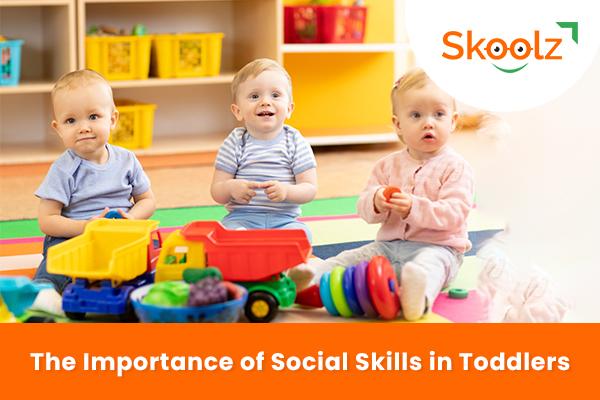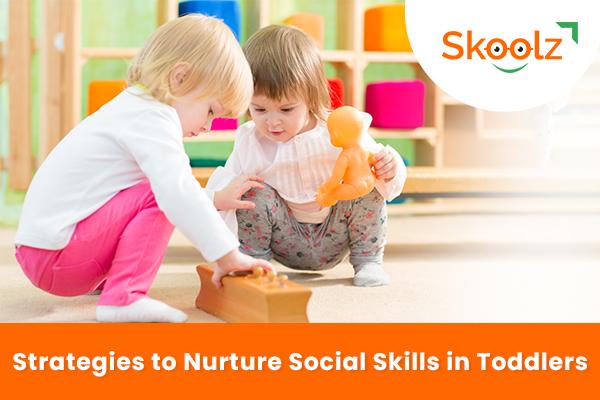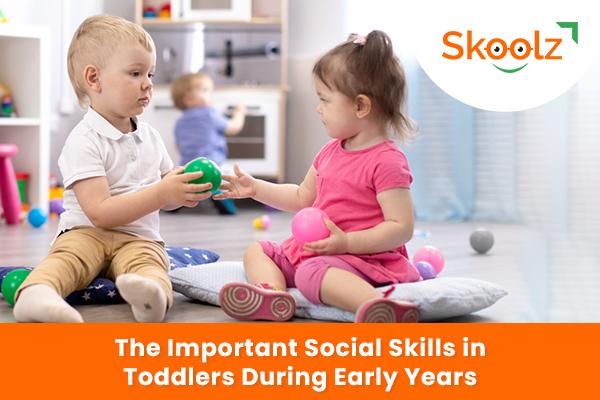
Building Bridges of Connection: Nurturing Social Skills in Toddlers
Building Bridges of Connection: Nurturing Social Skills in Toddlers
Social skills are an essential aspect of a toddler's development, shaping their ability to interact, communicate, and establish meaningful connections with others. As toddlers navigate the world around them, they begin to acquire the building blocks of social interaction, empathy, and cooperation. In this blog, we will explore the importance of social skills in toddlers, delve into the key components of social development, and provide practical strategies to nurture and strengthen social skills during this crucial stage of growth.
Social skills are essential for toddlers as they learn to interact with others, develop friendships, and navigate social situations.
Here are some essential social skills that toddlers typically develop during their early years:
The Important Social Skills in Toddlers During Early Years:
1. Sharing and Taking Turns:
Toddlers gradually learn the concept of sharing toys and taking turns during playtime. Encourage and model sharing behaviors to help them understand the importance of cooperation and waiting for their turn.
2. Empathy and Understanding Feelings:
Toddlers begin to recognize and understand the feelings of others. Encourage empathy by acknowledging their emotions and teaching them to respond with kindness and understanding.
3. Initiating and Joining Play:
As toddlers grow, they learn how to initiate play and invite others to join them. Encourage them to approach their peers, use simple greetings, and engage in cooperative play.
4. Respecting Personal Space:
Teach toddlers about personal boundaries and the importance of respecting personal space. Encourage gentle touch and help them understand that not everyone likes the same level of physical contact.
5. Cooperation and Teamwork:
Toddlers learn the value of working together towards a common goal. Engage them in simple cooperative activities where they can experience the benefits of teamwork, such as building a tower together or completing a puzzle as a group.
6. Following Simple Rules:
Introduce basic rules and expectations in a clear and consistent manner. Help toddlers understand and follow the rules, such as taking turns, using gentle hands, and using words to express their needs and wants.
7. Active Listening:
Encourage toddlers to practice active listening by maintaining eye contact, responding appropriately, and showing interest in what others are saying. Model good listening behaviors and engage them in conversations.
8. Problem-solving and Conflict Resolution:
Toddlers begin to learn problem-solving skills and how to resolve conflicts with peers. Teach them simple strategies such as using words to express their feelings, taking turns talking, and finding compromises.
9. Self-Expression:
Encourage toddlers to express their thoughts, ideas, and feelings in a positive and respectful manner. Validate their emotions and help them find appropriate ways to communicate their needs and desires.
10. Respect for Diversity:
Foster an inclusive environment where toddlers learn to respect and appreciate individual differences, including cultural, racial, and physical diversity. Expose them to diverse books, toys, and experiences that promote acceptance and understanding.
Remember that social skills develop over time, and each child progresses at their own pace. Provide opportunities for social interaction, engage in playdates or playgroups, and model positive social behaviors to support the development of social skills in toddlers.
The Importance of Social Skills in Toddlers:

Social skills are vital for a toddler's overall development and well-being. Here are some reasons why social skills are significant:
1. Relationship Building:
Social skills lay the foundation for establishing positive relationships with family, friends, and peers. Toddlers who develop strong social skills are better equipped to form healthy and meaningful connections, fostering a sense of belonging and emotional support.
2. Communication and Language Development:
Social skills go hand in hand with communication and language development. Through social interactions, toddlers learn to express themselves, listen to others, and engage in meaningful conversations. Effective communication skills enhance their ability to share thoughts, feelings, and ideas with others.
3. Empathy and Understanding:
Social skills enable toddlers to develop empathy and understanding towards others. They learn to recognize and respond to the emotions of those around them, fostering compassion, kindness, and respect. Developing empathy helps toddlers build positive relationships and navigate social situations with sensitivity.
4. Cooperation and Conflict Resolution:
Social skills empower toddlers to cooperate, collaborate, and work together with others. They learn to take turns, share, and solve conflicts peacefully. These skills promote positive social dynamics, teamwork, and the ability to negotiate and compromise effectively.
5. Emotional Regulation:
Social interactions provide opportunities for toddlers to practice emotional regulation. Through social skills development, they learn to manage their emotions, understand social cues, and respond appropriately in various social contexts. This leads to improved self-control and emotional well-being.
Strategies to Nurture Social Skills in Toddlers:

Here are some practical strategies to support the development of social skills in toddlers:
1. Encourage Playdates and Social Interactions:
Arrange playdates or group activities where toddlers can interact with their peers. Encourage sharing, taking turns, and engaging in cooperative play. Provide a safe and supervised environment that promotes positive social interactions.
2. Model and Teach Positive Behaviors:
Model and reinforce positive social behaviors such as sharing, taking turns, using kind words, and showing empathy. Toddlers learn by observing and imitating, so be a positive role model for them to emulate.
3. Engage in Pretend Play:
Participate in pretend play scenarios that involve social roles and interactions. Encourage toddlers to take on different roles, use their imagination, and practice social scripts. This helps them understand social norms and expectations.
4. Practice Active Listening:
Teach toddlers the importance of active listening by giving them your full attention. Engage in conversations, ask open-ended questions, and encourage them to express their thoughts and feelings. This builds their communication skills and shows them the value of listening to others.
5. Emphasize Emotional Literacy:
Help toddlers identify and label their emotions, as well as recognize emotions in others. Use age-appropriate language to discuss feelings and encourage them to express their emotions constructively. This promotes empathy and understanding.
6. Provide Opportunities for Cooperative Play:
Engage toddlers in activities that require cooperation and teamwork, such as building block structures together or working on puzzles collaboratively. Emphasize the importance of taking turns, sharing, and supporting each other.
7. Storytelling and Role-Playing:
Use storybooks and role-playing to explore social situations and problem-solving. Discuss characters' actions and emotions, encouraging toddlers to consider different perspectives and potential solutions.
8. Celebrate Diversity:
Expose toddlers to diverse cultures, backgrounds, and abilities. Encourage inclusivity respect for differences, and celebrate diversity. Teach them the value of treating everyone with kindness and acceptance.
Conclusion: Nurturing social skills in toddlers is a significant investment in their future well-being and success. Parents and caregivers can help toddlers navigate the complexities of social interactions with confidence, empathy, and respect by providing opportunities for social interaction, modeling positive behaviors, and guiding their social development. Embrace the joy of watching their social skills flourish as they form meaningful connections, collaborate, and build a strong foundation for a lifetime of positive social interactions.
Explore the possibilities offered by Skoolz to find the perfect preschool that nurtures your child's potential and prepares them for a bright future.
Disclaimer: The information in the blogs is intended to offer general guidance on various aspects of toddler development. However, it is essential to note that every child is unique, and individual circumstances may vary. The content in our blogs should not be considered a substitute for professional medical advice. If you observe any critical symptoms or have specific concerns about your child's health, we strongly advise consulting with a qualified pediatrician. We do not assume any responsibility or liability for actions taken based on the information provided. Always seek the expertise of a medical professional for any specific concerns or medical attention your child may require. By accessing our toddler blogs, you acknowledge the importance of consulting with a pediatrician for any critical symptoms or concerns.
 Written by:
Written by:
Bhawana Mohane
Digital Marketer

Building Bridges of Connection: Nurturing Social Skills in Toddlers
Social skills are an essential aspect of a toddler's development, shaping their ability to interact, communicate, and establish meaningful connections with others. As toddlers navigate the world around them, they begin to acquire the building blocks of social interaction, empathy, and cooperation. In this blog, we will explore the importance of social skills in toddlers, delve into the key components of social development, and provide practical strategies to nurture and strengthen social skills during this crucial stage of growth.
Social skills are essential for toddlers as they learn to interact with others, develop friendships, and navigate social situations.
Here are some essential social skills that toddlers typically develop during their early years:
The Important Social Skills in Toddlers During Early Years:
1. Sharing and Taking Turns:
Toddlers gradually learn the concept of sharing toys and taking turns during playtime. Encourage and model sharing behaviors to help them understand the importance of cooperation and waiting for their turn.
2. Empathy and Understanding Feelings:
Toddlers begin to recognize and understand the feelings of others. Encourage empathy by acknowledging their emotions and teaching them to respond with kindness and understanding.
3. Initiating and Joining Play:
As toddlers grow, they learn how to initiate play and invite others to join them. Encourage them to approach their peers, use simple greetings, and engage in cooperative play.
4. Respecting Personal Space:
Teach toddlers about personal boundaries and the importance of respecting personal space. Encourage gentle touch and help them understand that not everyone likes the same level of physical contact.
5. Cooperation and Teamwork:
Toddlers learn the value of working together towards a common goal. Engage them in simple cooperative activities where they can experience the benefits of teamwork, such as building a tower together or completing a puzzle as a group.
6. Following Simple Rules:
Introduce basic rules and expectations in a clear and consistent manner. Help toddlers understand and follow the rules, such as taking turns, using gentle hands, and using words to express their needs and wants.
7. Active Listening:
Encourage toddlers to practice active listening by maintaining eye contact, responding appropriately, and showing interest in what others are saying. Model good listening behaviors and engage them in conversations.
8. Problem-solving and Conflict Resolution:
Toddlers begin to learn problem-solving skills and how to resolve conflicts with peers. Teach them simple strategies such as using words to express their feelings, taking turns talking, and finding compromises.
9. Self-Expression:
Encourage toddlers to express their thoughts, ideas, and feelings in a positive and respectful manner. Validate their emotions and help them find appropriate ways to communicate their needs and desires.
10. Respect for Diversity:
Foster an inclusive environment where toddlers learn to respect and appreciate individual differences, including cultural, racial, and physical diversity. Expose them to diverse books, toys, and experiences that promote acceptance and understanding.
Remember that social skills develop over time, and each child progresses at their own pace. Provide opportunities for social interaction, engage in playdates or playgroups, and model positive social behaviors to support the development of social skills in toddlers.
The Importance of Social Skills in Toddlers:

Social skills are vital for a toddler's overall development and well-being. Here are some reasons why social skills are significant:
1. Relationship Building:
Social skills lay the foundation for establishing positive relationships with family, friends, and peers. Toddlers who develop strong social skills are better equipped to form healthy and meaningful connections, fostering a sense of belonging and emotional support.
2. Communication and Language Development:
Social skills go hand in hand with communication and language development. Through social interactions, toddlers learn to express themselves, listen to others, and engage in meaningful conversations. Effective communication skills enhance their ability to share thoughts, feelings, and ideas with others.
3. Empathy and Understanding:
Social skills enable toddlers to develop empathy and understanding towards others. They learn to recognize and respond to the emotions of those around them, fostering compassion, kindness, and respect. Developing empathy helps toddlers build positive relationships and navigate social situations with sensitivity.
4. Cooperation and Conflict Resolution:
Social skills empower toddlers to cooperate, collaborate, and work together with others. They learn to take turns, share, and solve conflicts peacefully. These skills promote positive social dynamics, teamwork, and the ability to negotiate and compromise effectively.
5. Emotional Regulation:
Social interactions provide opportunities for toddlers to practice emotional regulation. Through social skills development, they learn to manage their emotions, understand social cues, and respond appropriately in various social contexts. This leads to improved self-control and emotional well-being.
Strategies to Nurture Social Skills in Toddlers:

Here are some practical strategies to support the development of social skills in toddlers:
1. Encourage Playdates and Social Interactions:
Arrange playdates or group activities where toddlers can interact with their peers. Encourage sharing, taking turns, and engaging in cooperative play. Provide a safe and supervised environment that promotes positive social interactions.
2. Model and Teach Positive Behaviors:
Model and reinforce positive social behaviors such as sharing, taking turns, using kind words, and showing empathy. Toddlers learn by observing and imitating, so be a positive role model for them to emulate.
3. Engage in Pretend Play:
Participate in pretend play scenarios that involve social roles and interactions. Encourage toddlers to take on different roles, use their imagination, and practice social scripts. This helps them understand social norms and expectations.
4. Practice Active Listening:
Teach toddlers the importance of active listening by giving them your full attention. Engage in conversations, ask open-ended questions, and encourage them to express their thoughts and feelings. This builds their communication skills and shows them the value of listening to others.
5. Emphasize Emotional Literacy:
Help toddlers identify and label their emotions, as well as recognize emotions in others. Use age-appropriate language to discuss feelings and encourage them to express their emotions constructively. This promotes empathy and understanding.
6. Provide Opportunities for Cooperative Play:
Engage toddlers in activities that require cooperation and teamwork, such as building block structures together or working on puzzles collaboratively. Emphasize the importance of taking turns, sharing, and supporting each other.
7. Storytelling and Role-Playing:
Use storybooks and role-playing to explore social situations and problem-solving. Discuss characters' actions and emotions, encouraging toddlers to consider different perspectives and potential solutions.
8. Celebrate Diversity:
Expose toddlers to diverse cultures, backgrounds, and abilities. Encourage inclusivity respect for differences, and celebrate diversity. Teach them the value of treating everyone with kindness and acceptance.
Conclusion: Nurturing social skills in toddlers is a significant investment in their future well-being and success. Parents and caregivers can help toddlers navigate the complexities of social interactions with confidence, empathy, and respect by providing opportunities for social interaction, modeling positive behaviors, and guiding their social development. Embrace the joy of watching their social skills flourish as they form meaningful connections, collaborate, and build a strong foundation for a lifetime of positive social interactions.
Explore the possibilities offered by Skoolz to find the perfect preschool that nurtures your child's potential and prepares them for a bright future.
Disclaimer: The information in the blogs is intended to offer general guidance on various aspects of toddler development. However, it is essential to note that every child is unique, and individual circumstances may vary. The content in our blogs should not be considered a substitute for professional medical advice. If you observe any critical symptoms or have specific concerns about your child's health, we strongly advise consulting with a qualified pediatrician. We do not assume any responsibility or liability for actions taken based on the information provided. Always seek the expertise of a medical professional for any specific concerns or medical attention your child may require. By accessing our toddler blogs, you acknowledge the importance of consulting with a pediatrician for any critical symptoms or concerns.
 Written by:
Written by:
Bhawana Mohane
Digital Marketer





